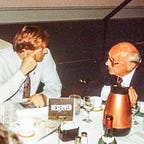Conservatism and Classical Liberalism Don’t Share the Same Values
Anne Applebaum laments how many of her friends from the political right are now authoritarians. She speaks of a group of them who were once at her home:
“…You might also have called most of my guests liberals — free-market liberals, or classical liberals — or maybe Thatcherites. Even those who might have been less definite about economics certainly believed in democracy, in the rule of law, and in a Poland that was a member of Nato and on its way to joining the European Union — an integrated part of modern Europe.”
I suggest she is seeing this among those people because she is defining classical liberalism as “free market” primarily; in other words, if someone claims to believe in free markets they are a classical liberal. NO. Economic freedom is one part of the classical liberal agenda and history, but only one part.
Applebaum seemed to define her “classical liberalism” as primarily, if not exclusively, economic. She equated “classical liberalism” to “free-market liberals.” Free markets are only a portion of the liberal agenda.
Classical liberalism was fighting for issues such as abolitionism and freedom of conscience BEFORE it was fighting for markets. Classical liberalism was already explicitly defending rights — perhaps not consistently, but it is made up of humans — well before Adam Smith published The Wealth of Nations.
Too many sympathizers to libertarian ideas think the core of liberalism is free markets and thus they fall for the delusion that conservatives are some variant of “classical liberal,” because they claim to support markets.
But, a classical liberal holds to individual rights as his core value, not markets. Markets are derivatives of rights theory. It is intertwined with the liberal theory of rights. Conservatives tend to oppose individual rights for collectivist concepts. The “common good” comes before individual rights to them, provided you define the common good with religious terms. It is no different with the illiberal Left, who make similar arguments.
Individual rights means individualism — something for which conservatives don’t care. They are advocates of the herd, they preach social conformity in the name of tradition. They are happy for you to be free regarding which toothpaste to buy, just not thrilled if you assert the right to pick which person to marry, outside their approved categories.
Economic freedom is easy, social freedom is hard. Economics, while individualistic at its core, is also very herd oriented. Let me explain what I mean. Human economic needs are global, pervasive, and common to all. We need to produce to survive; we need food, shelter, etc. These are what Abraham Maslow called lower order needs.
All of us need food. Economic needs are not particularly individualistic. Thus conservatives don’t immediately oppose this freedom in the short term. I do think they oppose it in the long term, and there were plenty of times in history when conservatives opposed it in the short term as well, just generally not today. Conservatives have not been friends of free markets overall. Economic rights just aren’t seen as automatically threatening to the conservative herd identity.
What really gets the conservative’s back up is social freedom. Social freedom is freedom in the social, non-market realm. It is linked to markets but it is heavily about individualistic wants and needs, or what Maslow called self-actualization needs. Lower order needs tend to be relatively similar for all. Higher order needs are strongly individualized.
The conservative is happy with freedom for the herd — that is in those areas where everyone has roughly similar needs — just not freedom for the individual — where needs and wants are unique, individualistic, perhaps even idiosyncratic or eccentric.
The further you get from herd needs the more uncomfortable the conservative gets. Transgender individuals are a relatively small percentage of the population, but take up an inordinate amount of conservative attention — all of it negative. The smaller the minority the more likely, I suggest, the conservative is to attack it. The closer it gets to the unique individual, the further it drifts from the herd and conservative values are ultimately herd values.
Theirs were values fit for a world where food was scarce and life was primitive. It just isn’t fit for a world of surplus and relative ease — relative to how humans lived for most of history. For the conservative mind it is easy to be “liberal” when it comes to property rights, difficult when it comes to gender identity, same-sex marriage, religious skepticism, etc.
In today’s world, economic freedom is largely respected — not enough perhaps, and certainly not enough to satisfy the fundamentalist libertarian — but economic freedom alone is not enough. We can’t just equate classical liberalism with economic rights. Given the consensus in favor of markets — impure ones perhaps, but still markets — it is much more telling to discover how much social freedom one is willing to grant. Where they stand on rights for LGBT people, or “illegal” drugs, or censorship of erotica, is more indicative as to whether they are a classical liberal than their position on price controls or lower taxes.
I suspect many of Ms. Applebaum’s friends were only “liberal” in regards to economics, but underneath they were advocates of herd conformity. Capitalism empowers individualism and that threatens conservatives. If to enforce herd values they have to restrain economic freedom they will do so. When herd politics becomes dominant — such as fascism, nationalism and other such collectivist-based views — the conservative will happily goose-step with the herd and turn his back on markets. Isn’t that precisely what we seeing in America today with Trumpian conservatives?
If you wish to support these columns donate on our page at Patreon.
